Analysis of Populist and Progressive Reformers in American History
VerifiedAdded on 2023/04/21
|5
|1329
|191
Essay
AI Summary
This essay provides a comprehensive analysis of the populist and progressive reformers who significantly shaped American society, economy, and politics, particularly during the 19th century. It begins by outlining the societal context, including the pervasive issue of slavery and its impact on inequality and the American Civil War. The essay then details the actions and contributions of key reformers such as Thomas Jefferson, Benjamin Franklin, and William Lloyd Garrison, highlighting their efforts to abolish slavery and promote human rights. It explores the various methods employed by activists, including social movements, boycotts, and educational campaigns, to advance their agenda. The essay emphasizes the ethical considerations that guided the reformers, their commitment to social justice, and their shared values with the American people. It concludes by underscoring the lasting impact of these reformers, citing legislative amendments and paradigm shifts that reorganized American society and provided meaning to liberty, opportunity, and equality. The essay draws on several sources, including historical documents and scholarly works, to support its arguments and provide a well-rounded perspective on the subject.
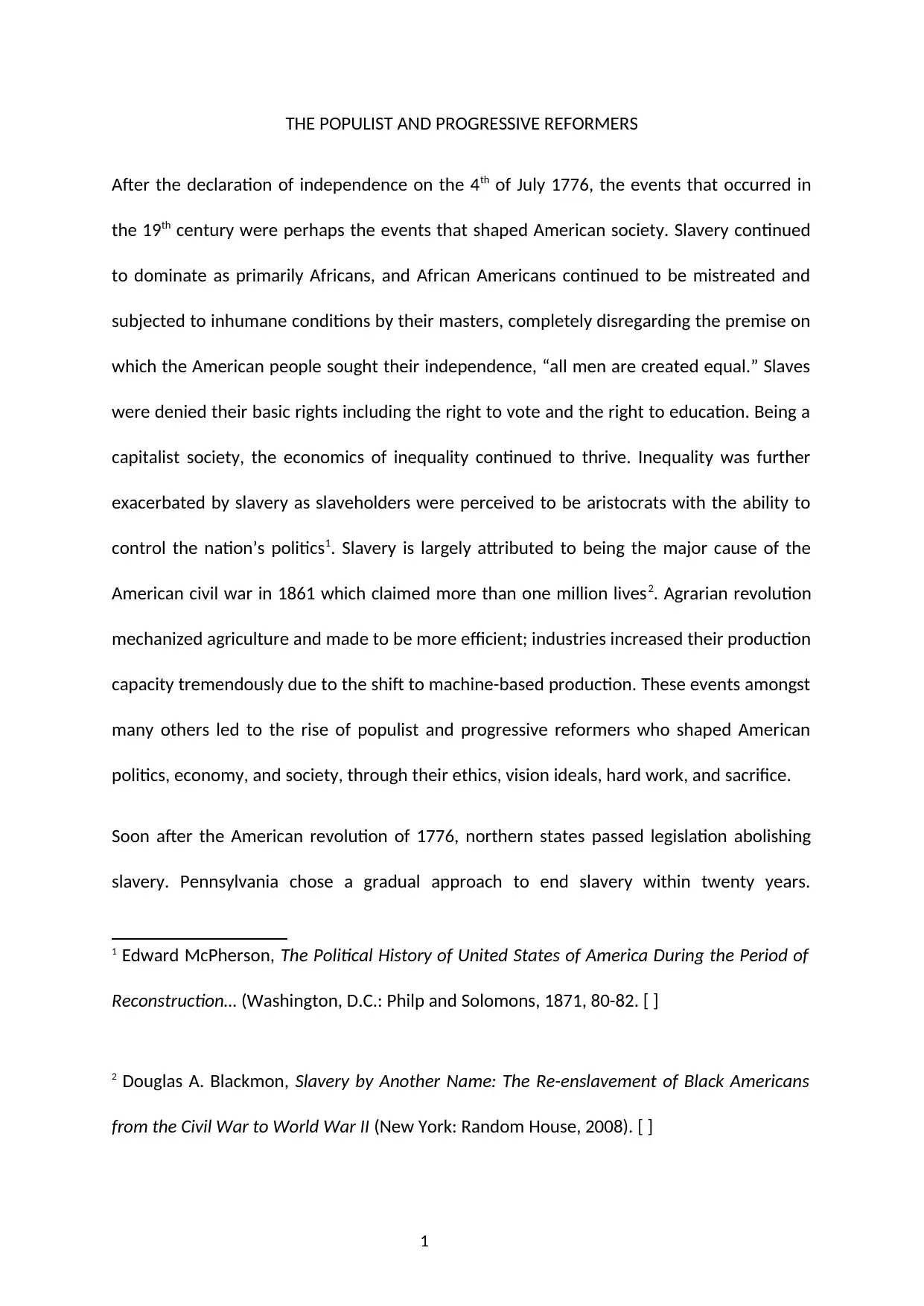
THE POPULIST AND PROGRESSIVE REFORMERS
After the declaration of independence on the 4th of July 1776, the events that occurred in
the 19th century were perhaps the events that shaped American society. Slavery continued
to dominate as primarily Africans, and African Americans continued to be mistreated and
subjected to inhumane conditions by their masters, completely disregarding the premise on
which the American people sought their independence, “all men are created equal.” Slaves
were denied their basic rights including the right to vote and the right to education. Being a
capitalist society, the economics of inequality continued to thrive. Inequality was further
exacerbated by slavery as slaveholders were perceived to be aristocrats with the ability to
control the nation’s politics1. Slavery is largely attributed to being the major cause of the
American civil war in 1861 which claimed more than one million lives2. Agrarian revolution
mechanized agriculture and made to be more efficient; industries increased their production
capacity tremendously due to the shift to machine-based production. These events amongst
many others led to the rise of populist and progressive reformers who shaped American
politics, economy, and society, through their ethics, vision ideals, hard work, and sacrifice.
Soon after the American revolution of 1776, northern states passed legislation abolishing
slavery. Pennsylvania chose a gradual approach to end slavery within twenty years.
1 Edward McPherson, The Political History of United States of America During the Period of
Reconstruction… (Washington, D.C.: Philp and Solomons, 1871, 80-82. [ ]
2 Douglas A. Blackmon, Slavery by Another Name: The Re-enslavement of Black Americans
from the Civil War to World War II (New York: Random House, 2008). [ ]
1
After the declaration of independence on the 4th of July 1776, the events that occurred in
the 19th century were perhaps the events that shaped American society. Slavery continued
to dominate as primarily Africans, and African Americans continued to be mistreated and
subjected to inhumane conditions by their masters, completely disregarding the premise on
which the American people sought their independence, “all men are created equal.” Slaves
were denied their basic rights including the right to vote and the right to education. Being a
capitalist society, the economics of inequality continued to thrive. Inequality was further
exacerbated by slavery as slaveholders were perceived to be aristocrats with the ability to
control the nation’s politics1. Slavery is largely attributed to being the major cause of the
American civil war in 1861 which claimed more than one million lives2. Agrarian revolution
mechanized agriculture and made to be more efficient; industries increased their production
capacity tremendously due to the shift to machine-based production. These events amongst
many others led to the rise of populist and progressive reformers who shaped American
politics, economy, and society, through their ethics, vision ideals, hard work, and sacrifice.
Soon after the American revolution of 1776, northern states passed legislation abolishing
slavery. Pennsylvania chose a gradual approach to end slavery within twenty years.
1 Edward McPherson, The Political History of United States of America During the Period of
Reconstruction… (Washington, D.C.: Philp and Solomons, 1871, 80-82. [ ]
2 Douglas A. Blackmon, Slavery by Another Name: The Re-enslavement of Black Americans
from the Civil War to World War II (New York: Random House, 2008). [ ]
1
Paraphrase This Document
Need a fresh take? Get an instant paraphrase of this document with our AI Paraphraser
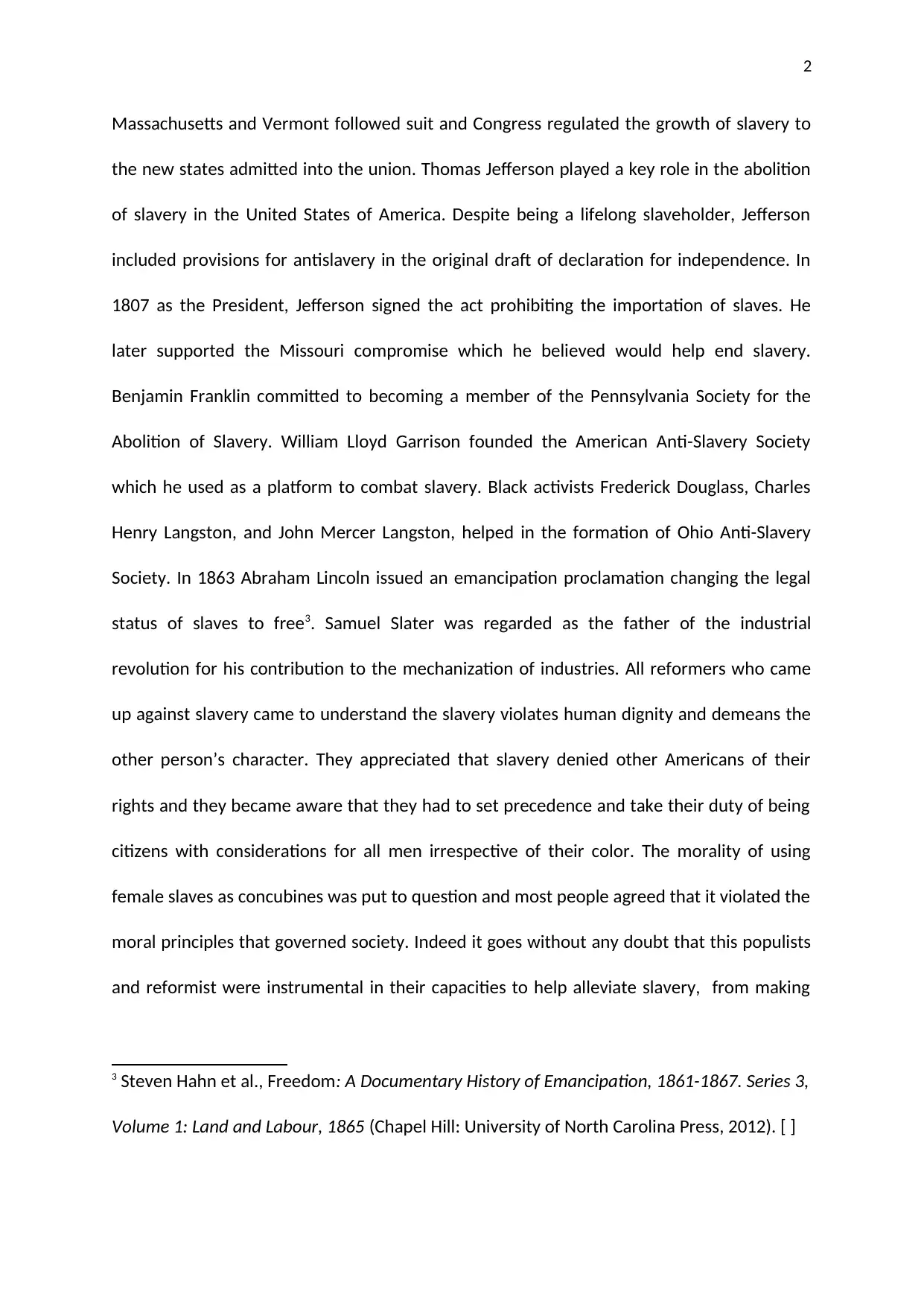
2
Massachusetts and Vermont followed suit and Congress regulated the growth of slavery to
the new states admitted into the union. Thomas Jefferson played a key role in the abolition
of slavery in the United States of America. Despite being a lifelong slaveholder, Jefferson
included provisions for antislavery in the original draft of declaration for independence. In
1807 as the President, Jefferson signed the act prohibiting the importation of slaves. He
later supported the Missouri compromise which he believed would help end slavery.
Benjamin Franklin committed to becoming a member of the Pennsylvania Society for the
Abolition of Slavery. William Lloyd Garrison founded the American Anti-Slavery Society
which he used as a platform to combat slavery. Black activists Frederick Douglass, Charles
Henry Langston, and John Mercer Langston, helped in the formation of Ohio Anti-Slavery
Society. In 1863 Abraham Lincoln issued an emancipation proclamation changing the legal
status of slaves to free3. Samuel Slater was regarded as the father of the industrial
revolution for his contribution to the mechanization of industries. All reformers who came
up against slavery came to understand the slavery violates human dignity and demeans the
other person’s character. They appreciated that slavery denied other Americans of their
rights and they became aware that they had to set precedence and take their duty of being
citizens with considerations for all men irrespective of their color. The morality of using
female slaves as concubines was put to question and most people agreed that it violated the
moral principles that governed society. Indeed it goes without any doubt that this populists
and reformist were instrumental in their capacities to help alleviate slavery, from making
3 Steven Hahn et al., Freedom: A Documentary History of Emancipation, 1861-1867. Series 3,
Volume 1: Land and Labour, 1865 (Chapel Hill: University of North Carolina Press, 2012). [ ]
Massachusetts and Vermont followed suit and Congress regulated the growth of slavery to
the new states admitted into the union. Thomas Jefferson played a key role in the abolition
of slavery in the United States of America. Despite being a lifelong slaveholder, Jefferson
included provisions for antislavery in the original draft of declaration for independence. In
1807 as the President, Jefferson signed the act prohibiting the importation of slaves. He
later supported the Missouri compromise which he believed would help end slavery.
Benjamin Franklin committed to becoming a member of the Pennsylvania Society for the
Abolition of Slavery. William Lloyd Garrison founded the American Anti-Slavery Society
which he used as a platform to combat slavery. Black activists Frederick Douglass, Charles
Henry Langston, and John Mercer Langston, helped in the formation of Ohio Anti-Slavery
Society. In 1863 Abraham Lincoln issued an emancipation proclamation changing the legal
status of slaves to free3. Samuel Slater was regarded as the father of the industrial
revolution for his contribution to the mechanization of industries. All reformers who came
up against slavery came to understand the slavery violates human dignity and demeans the
other person’s character. They appreciated that slavery denied other Americans of their
rights and they became aware that they had to set precedence and take their duty of being
citizens with considerations for all men irrespective of their color. The morality of using
female slaves as concubines was put to question and most people agreed that it violated the
moral principles that governed society. Indeed it goes without any doubt that this populists
and reformist were instrumental in their capacities to help alleviate slavery, from making
3 Steven Hahn et al., Freedom: A Documentary History of Emancipation, 1861-1867. Series 3,
Volume 1: Land and Labour, 1865 (Chapel Hill: University of North Carolina Press, 2012). [ ]
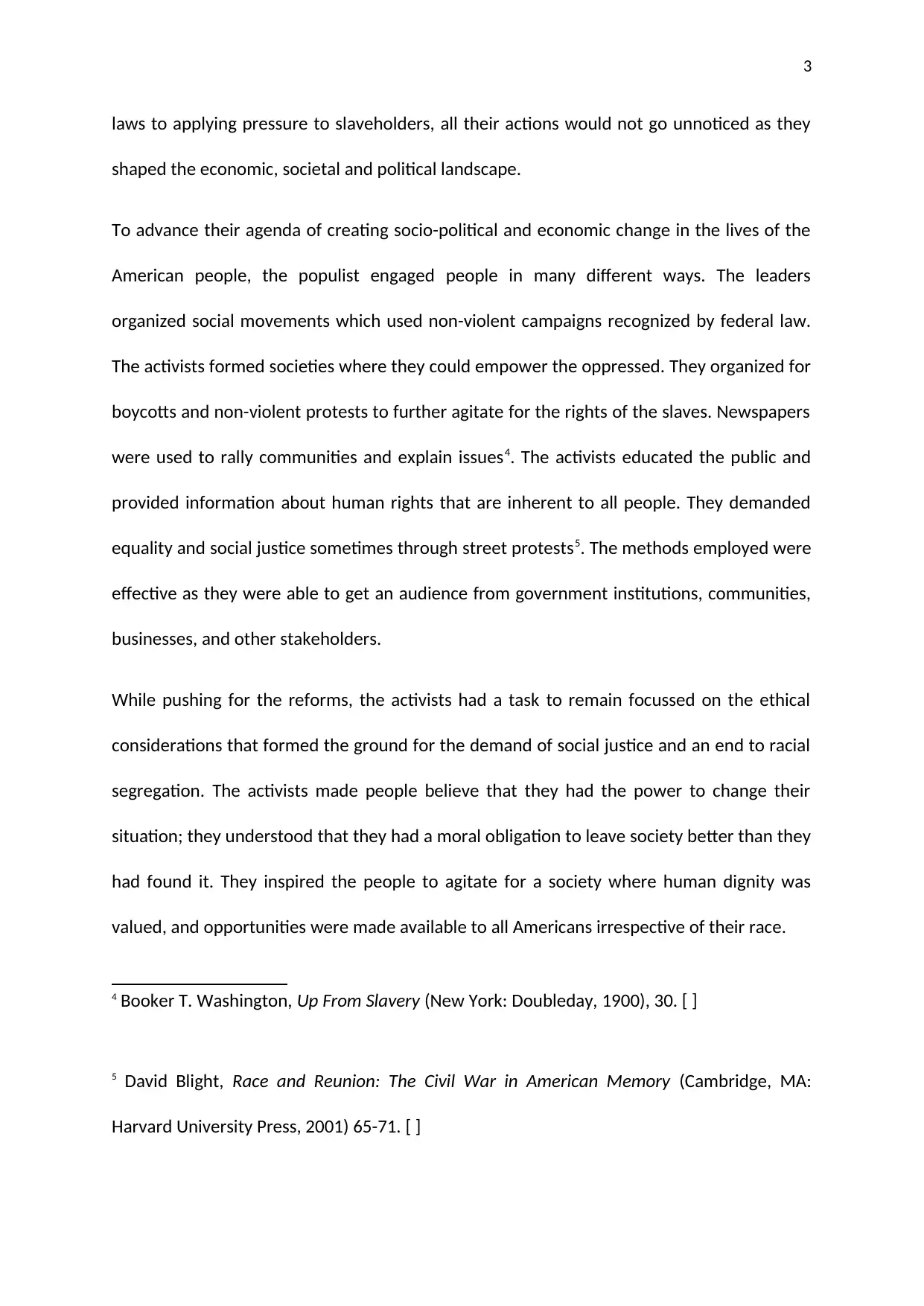
3
laws to applying pressure to slaveholders, all their actions would not go unnoticed as they
shaped the economic, societal and political landscape.
To advance their agenda of creating socio-political and economic change in the lives of the
American people, the populist engaged people in many different ways. The leaders
organized social movements which used non-violent campaigns recognized by federal law.
The activists formed societies where they could empower the oppressed. They organized for
boycotts and non-violent protests to further agitate for the rights of the slaves. Newspapers
were used to rally communities and explain issues4. The activists educated the public and
provided information about human rights that are inherent to all people. They demanded
equality and social justice sometimes through street protests5. The methods employed were
effective as they were able to get an audience from government institutions, communities,
businesses, and other stakeholders.
While pushing for the reforms, the activists had a task to remain focussed on the ethical
considerations that formed the ground for the demand of social justice and an end to racial
segregation. The activists made people believe that they had the power to change their
situation; they understood that they had a moral obligation to leave society better than they
had found it. They inspired the people to agitate for a society where human dignity was
valued, and opportunities were made available to all Americans irrespective of their race.
4 Booker T. Washington, Up From Slavery (New York: Doubleday, 1900), 30. [ ]
5 David Blight, Race and Reunion: The Civil War in American Memory (Cambridge, MA:
Harvard University Press, 2001) 65-71. [ ]
laws to applying pressure to slaveholders, all their actions would not go unnoticed as they
shaped the economic, societal and political landscape.
To advance their agenda of creating socio-political and economic change in the lives of the
American people, the populist engaged people in many different ways. The leaders
organized social movements which used non-violent campaigns recognized by federal law.
The activists formed societies where they could empower the oppressed. They organized for
boycotts and non-violent protests to further agitate for the rights of the slaves. Newspapers
were used to rally communities and explain issues4. The activists educated the public and
provided information about human rights that are inherent to all people. They demanded
equality and social justice sometimes through street protests5. The methods employed were
effective as they were able to get an audience from government institutions, communities,
businesses, and other stakeholders.
While pushing for the reforms, the activists had a task to remain focussed on the ethical
considerations that formed the ground for the demand of social justice and an end to racial
segregation. The activists made people believe that they had the power to change their
situation; they understood that they had a moral obligation to leave society better than they
had found it. They inspired the people to agitate for a society where human dignity was
valued, and opportunities were made available to all Americans irrespective of their race.
4 Booker T. Washington, Up From Slavery (New York: Doubleday, 1900), 30. [ ]
5 David Blight, Race and Reunion: The Civil War in American Memory (Cambridge, MA:
Harvard University Press, 2001) 65-71. [ ]
⊘ This is a preview!⊘
Do you want full access?
Subscribe today to unlock all pages.

Trusted by 1+ million students worldwide
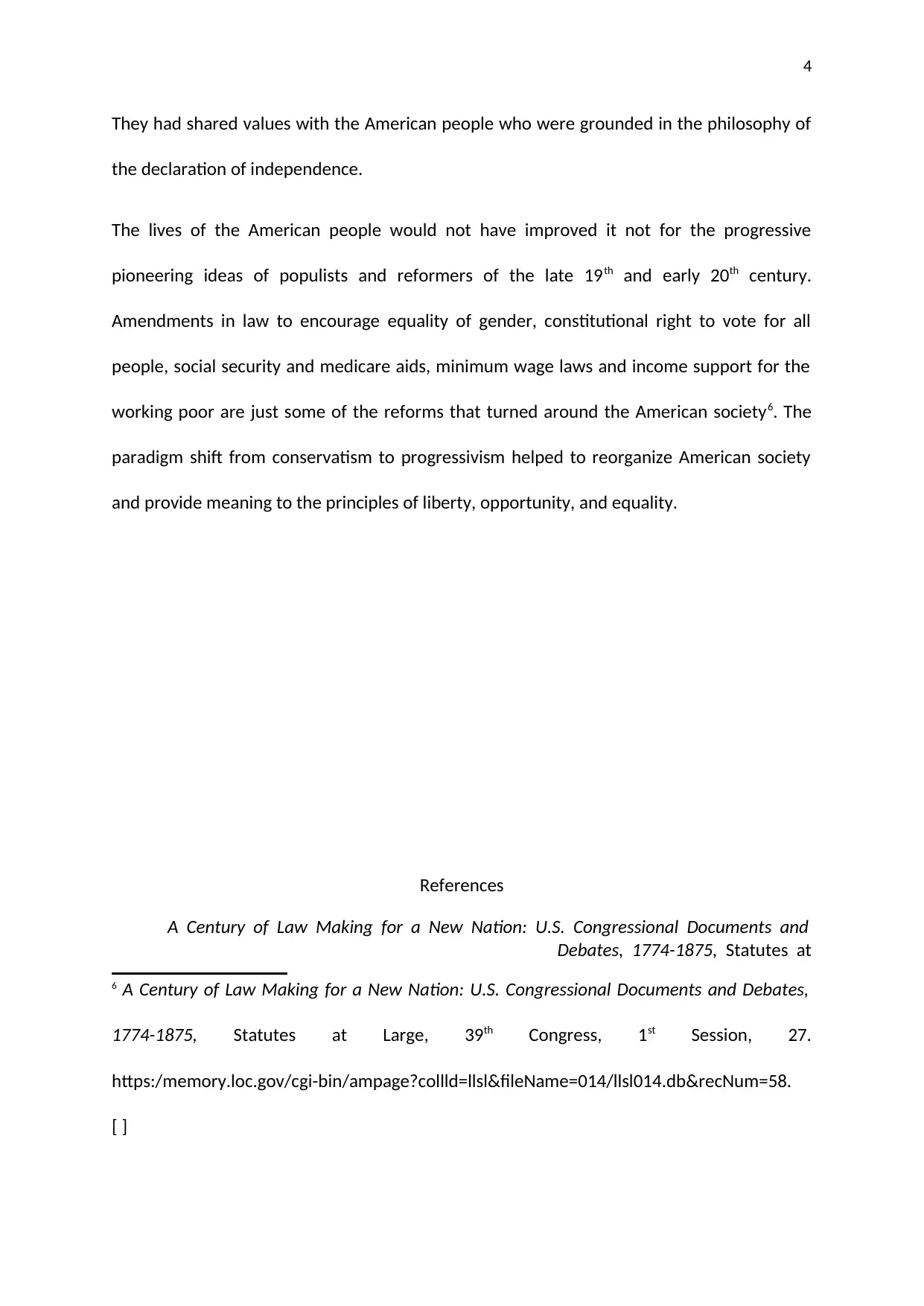
4
They had shared values with the American people who were grounded in the philosophy of
the declaration of independence.
The lives of the American people would not have improved it not for the progressive
pioneering ideas of populists and reformers of the late 19th and early 20th century.
Amendments in law to encourage equality of gender, constitutional right to vote for all
people, social security and medicare aids, minimum wage laws and income support for the
working poor are just some of the reforms that turned around the American society6. The
paradigm shift from conservatism to progressivism helped to reorganize American society
and provide meaning to the principles of liberty, opportunity, and equality.
References
A Century of Law Making for a New Nation: U.S. Congressional Documents and
Debates, 1774-1875, Statutes at
6 A Century of Law Making for a New Nation: U.S. Congressional Documents and Debates,
1774-1875, Statutes at Large, 39th Congress, 1st Session, 27.
https:/memory.loc.gov/cgi-bin/ampage?collld=llsl&fileName=014/llsl014.db&recNum=58.
[ ]
They had shared values with the American people who were grounded in the philosophy of
the declaration of independence.
The lives of the American people would not have improved it not for the progressive
pioneering ideas of populists and reformers of the late 19th and early 20th century.
Amendments in law to encourage equality of gender, constitutional right to vote for all
people, social security and medicare aids, minimum wage laws and income support for the
working poor are just some of the reforms that turned around the American society6. The
paradigm shift from conservatism to progressivism helped to reorganize American society
and provide meaning to the principles of liberty, opportunity, and equality.
References
A Century of Law Making for a New Nation: U.S. Congressional Documents and
Debates, 1774-1875, Statutes at
6 A Century of Law Making for a New Nation: U.S. Congressional Documents and Debates,
1774-1875, Statutes at Large, 39th Congress, 1st Session, 27.
https:/memory.loc.gov/cgi-bin/ampage?collld=llsl&fileName=014/llsl014.db&recNum=58.
[ ]
Paraphrase This Document
Need a fresh take? Get an instant paraphrase of this document with our AI Paraphraser
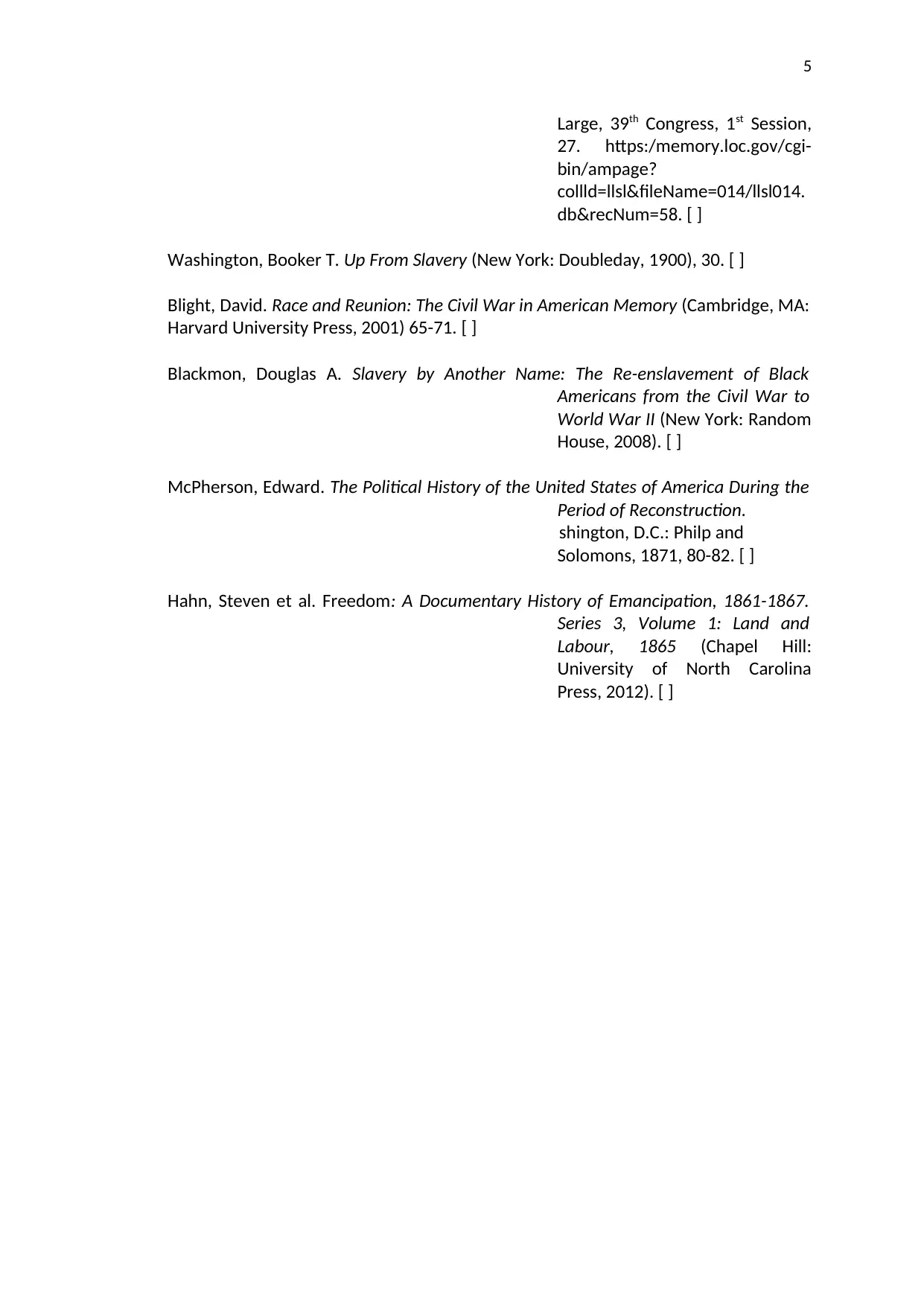
5
Large, 39th Congress, 1st Session,
27. https:/memory.loc.gov/cgi-
bin/ampage?
collld=llsl&fileName=014/llsl014.
db&recNum=58. [ ]
Washington, Booker T. Up From Slavery (New York: Doubleday, 1900), 30. [ ]
Blight, David. Race and Reunion: The Civil War in American Memory (Cambridge, MA:
Harvard University Press, 2001) 65-71. [ ]
Blackmon, Douglas A. Slavery by Another Name: The Re-enslavement of Black
Americans from the Civil War to
World War II (New York: Random
House, 2008). [ ]
McPherson, Edward. The Political History of the United States of America During the
Period of Reconstruction.
shington, D.C.: Philp and
Solomons, 1871, 80-82. [ ]
Hahn, Steven et al. Freedom: A Documentary History of Emancipation, 1861-1867.
Series 3, Volume 1: Land and
Labour, 1865 (Chapel Hill:
University of North Carolina
Press, 2012). [ ]
Large, 39th Congress, 1st Session,
27. https:/memory.loc.gov/cgi-
bin/ampage?
collld=llsl&fileName=014/llsl014.
db&recNum=58. [ ]
Washington, Booker T. Up From Slavery (New York: Doubleday, 1900), 30. [ ]
Blight, David. Race and Reunion: The Civil War in American Memory (Cambridge, MA:
Harvard University Press, 2001) 65-71. [ ]
Blackmon, Douglas A. Slavery by Another Name: The Re-enslavement of Black
Americans from the Civil War to
World War II (New York: Random
House, 2008). [ ]
McPherson, Edward. The Political History of the United States of America During the
Period of Reconstruction.
shington, D.C.: Philp and
Solomons, 1871, 80-82. [ ]
Hahn, Steven et al. Freedom: A Documentary History of Emancipation, 1861-1867.
Series 3, Volume 1: Land and
Labour, 1865 (Chapel Hill:
University of North Carolina
Press, 2012). [ ]
1 out of 5
Related Documents
Your All-in-One AI-Powered Toolkit for Academic Success.
+13062052269
info@desklib.com
Available 24*7 on WhatsApp / Email
![[object Object]](/_next/static/media/star-bottom.7253800d.svg)
Unlock your academic potential
Copyright © 2020–2026 A2Z Services. All Rights Reserved. Developed and managed by ZUCOL.





